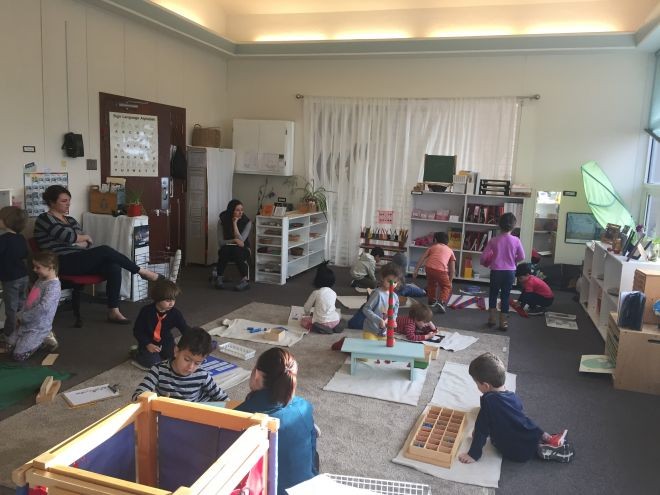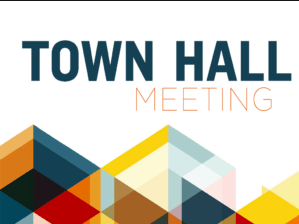The Society by Cohesion: Why Did We Have To Have All These Kids, Anyway?

Below you will find a beautifully written article, written by Montessori advocate and author Catherine McTamaney, about how a Montessori classroom functions. She so concisely sums up some of the most basic and important tenants of a Montessori classroom (including why there are so many kids in a classroom) to describe their place in our environment and, most importantly, their outcome!
Enjoy!
Glance through some school brochures. You’ll notice quite a bit of language in common: whole child, child-centered, low student-teacher ratios, individualized attention. If so many school settings agree that fewer children per teacher is something to brag about, why are Montessori classrooms so large?
Remember the basic design principles of a Montessori classroom: multiage classrooms, specialized materials and extended time to explore them, professionally-prepared teachers and individualized curricula to match each child.
The curriculum not only complements the first three factors size: it relies on it. Because Montessori classrooms are multi-aged, with specialized materials and professionally-prepared teachers, the curricula can be truly individualized to the child.
The multi-aged classroom allows children to look to and rely on each other to get their needs met independently of an adult. Older children can offer guidance and direction to younger children. Younger children can provide practice and new questions to their older peers. Children across the age spectrum develop independent skills, learning to rely on the tools they have available to them and coming, through practice, to regulate their choices on their own. Children’s natural curiosity and intrinsic motivation to learn are protected when their reliance on adults is limited. There’s simply no space for helicopter adults in a classroom with so many children. Instead, children learn to look to each other or to find their own agency in solving problems, what Montessori called, “The Society by Cohesion.”
The materials, too, help to support the individualized development of each child. Because each lesson is self-correcting, learners need not wait for a teacher to “check their work,” or look to an adult to know whether they’ve mastered a concept. The ability to assess their own learning is fostered by the design of the materials. Meanwhile, their resilience to struggle through challenges also grows, as children work to make sure the box lid closes or to integrate the extra pieces left over while they’re first practicing new lessons. Adults are able to serve the role of facilitator instead of assessor, supporting children’s mastery of the material without devoted hours to checking their work. When materials require an adult’s expertise to “know if they got it right,” the group size necessarily has to be small enough for the adult to assess each child. Self-correcting materials mean that Montessori teachers spend most of their time observing individual children to make sure the materials available are precisely the ones they need and preparing the classrooms that best serve those needs, rather than allotting time every day to respond to children’s work as a human answer-key.
The three-hour work cycle, too, allows for a more individualized curriculum. Learners don’t have to segment their interest into predetermined content areas. They can read whenever they choose, not just during the fifty minutes or so allowed for “Reading” on a traditional classroom’s daily schedule. Extended time means children can spend as much time as they want working on the lessons that motivate them most, delving more deeply into content that’s challenging for them and having sufficient time to figure it out. The extended work cycle also allows teachers to offer lessons to multiple children over the course of a day. A shorter window of time would require fewer children, because the teacher would need to make sure each one had mastered the content she intended for that day before moving on.
None of this could happen without professionally-prepared teachers who know how to observe children, who know their materials well enough to know when to provide them, and who know children’s development well enough to make the connections between what they see and what they prepare. Understanding that the child must know how to learn and not just how to listen, Montessori teachers don’t choose a particular subject area to master; instead, they are generalists among all the areas of the curriculum, and focus their mastery on child development across the social, emotional, intellectual, academic and physical domains. Montessori teachers are not conduits of a prepackaged curriculum. Instead, they serve as scientists in the classroom. Their area of research is the individualized development of each child in the room, prepared for within a context of a larger understanding of children in general and developed to respond to the distinct development of each specific child.
While a Montessori classroom with twenty-four children and two adults in it may have a 12:1 ratio, in practice, they’re 1:1. Children are either working directly with a teacher, one at a time, or they are pursuing their own individual interests and meeting their own individual needs. A teacher’s attention isn’t given in 1/24 servings to each child, but in its entirety to one child at a time. As one teacher is focused without distraction on any one child, the other teacher is available as a resource to the rest of the classroom. The balance results in environments that serve larger groups of children with more individual attention than would be possible in a classroom in which we expected every child to be doing the same thing all day long. The systems of the Montessori classroom support the diversity of learning authentically expressed by individual children who are each unique contributors, no matter how many there are.
August 13, 2018
Catherine McTamaney
